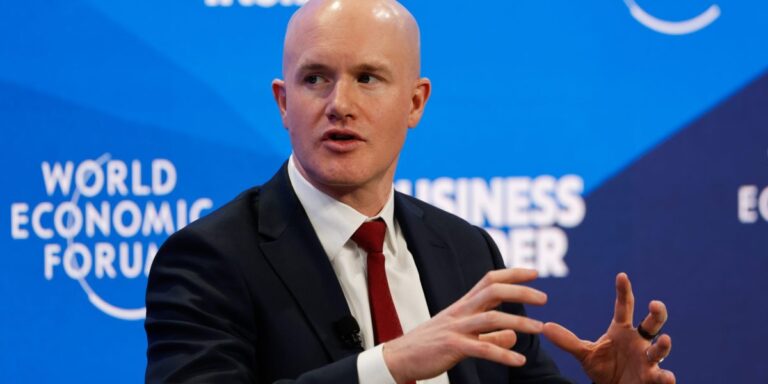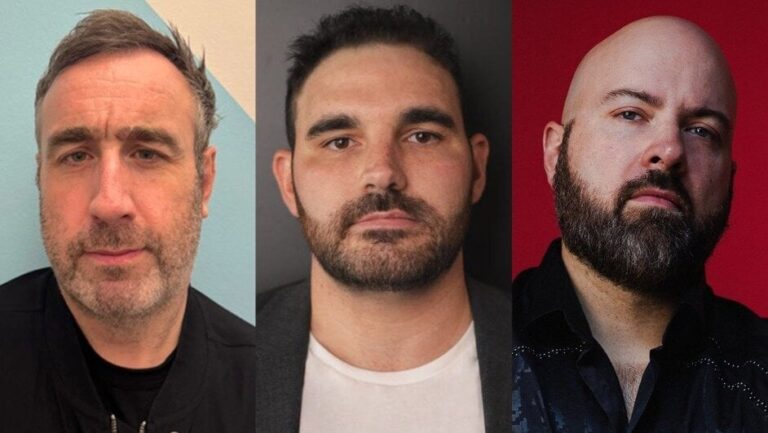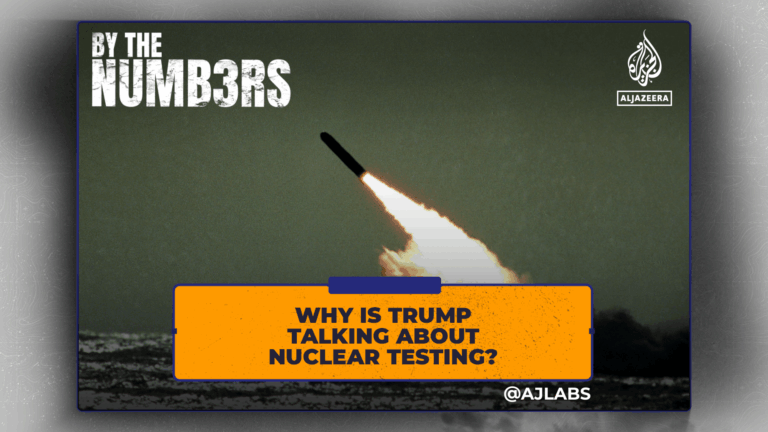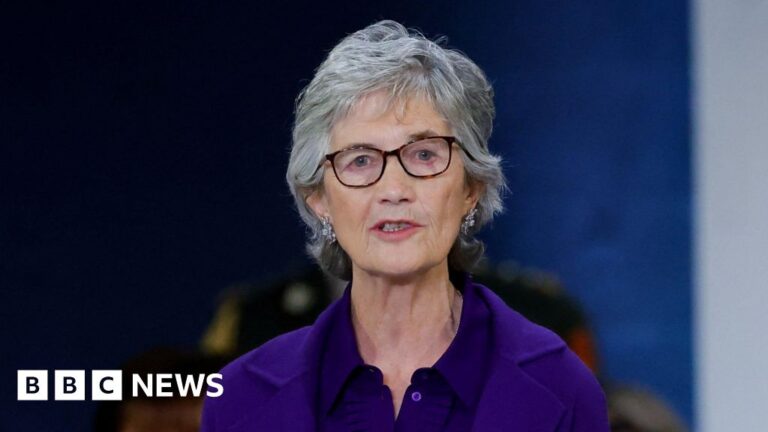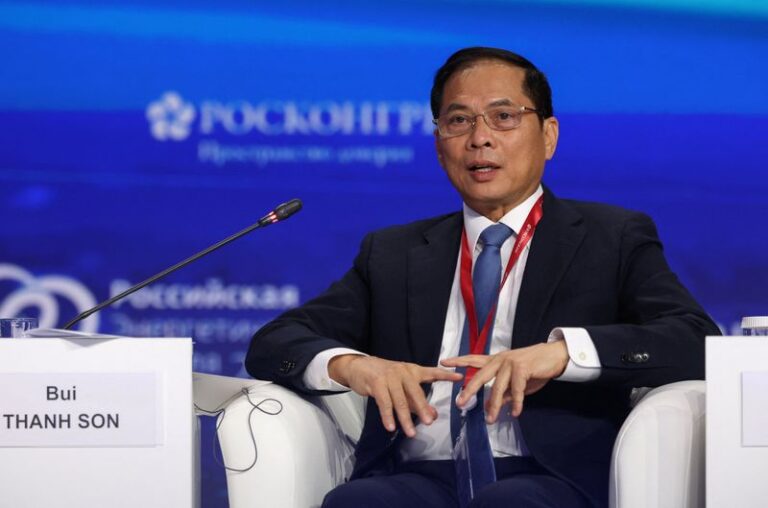
J&E Davy reports trading activity in Permanent TSB shares
Trading Activity in Permanent TSB Shares Reported by J&E Davy
Increase Consumption for Brain Wellness
Scientists have identified a significant link between low levels of choline and the prevalence of anxiety disorders, suggesting that upping intake of this essential nutrient found in a range of foods – from eggs to seeds – could potentially improve symptoms of these debilitating conditions.
University of California Davis (UC Davis) researchers analyzed data from 25 studies that compared levels of neurometabolites in a total of 370 patients with at least one anxiety disorder diagnosis and 342 controls. Neurometabolites are the chemical products of metabolism in the brain, indicating neural activity, and have increasingly been the focus of scientists for conditions like schizophrenia and myalgic encephalomyelitis/chronic fatigue syndrome. In the study, the researchers looked at a range of these brain metabolites including n-acetlyaspartate (NAA), total creatine, total choline, myo-inositol, glutamate, glutamate and glutamine, GABA and lactate.
Observing measures produced through proton magnetic resonance spectroscopy (H-MRS), the scientists identified that levels of choline were significantly lower – average of 8% – in the brains of people with anxiety disorders compared with the control, and the difference was most pronounced and consistent in scans of the prefrontal cortex, the region that regulates emotion, behavior and executive function.
“This is the first meta-analysis to show a chemical pattern in the brain in anxiety disorders,” said study co-author Jason Smucny, an assistant professor in the Department of Psychiatry and Behavioral Sciences at UC Davis. “It suggests nutritional approaches – like appropriate choline supplementation – may help restore brain chemistry and improve outcomes for patients.”
Choline is an essential nutrient, which we need to get from our diet because the levels produced in the liver (as phosphatidylcholine) isn’t sufficient. The most common dietary sources of it are as the fat-soluble phospholipids phosphatidylcholine and sphingomyelin found in a broad range of foods including eggs, beef liver, red meat, chicken, potatoes, yogurt, fish, cruciferous vegetables and grains. About 90% of US adults are not meeting their daily choline requirements (550 mg/day for men, 425 mg/day for women who aren’t pregnant or menopausal).
While the chemical plays a large role in cell function, it’s also key in the production of acetylcholine, an important neurotransmitter for memory, mood and other brain and nervous system functions. So low levels in the prefrontal cortex, which is charged with many of these functions, could impair vital brain operations for our mental health. Anxiety disorders are linked to dysfunction in the fear-sensing amygdala – and the prefrontal cortex.
“Anxiety disorders are the most common mental illness in the United States, affecting about 30% of adults. They can be debilitating for people, and many people do not receive adequate treatment,” said senior author Richard Maddock, a psychiatrist and research professor at UC Davis.
In the study, the conditions under the “anxiety” umbrella included social anxiety disorder, generalized anxiety disorder, and panic disorder. They’re linked to imbalances in neurotransmitters, including norepinephrine that plays a critical role in the body’s “fight or flight” stress response. The researchers suggest that, for people with anxiety, this fight-or-flight response may demand higher levels of choline than in non-anxious brains, which could be draining this chemical’s levels as a result.
“An 8% lower amount doesn’t sound like that much, but in the brain it’s significant,” said Maddock, who has spent decades treating patients with anxiety disorders and undertaking research to better understand brain chemical imbalances. “We don’t know yet if increasing choline in the diet will help reduce anxiety. More research will be needed.”
In 2008, Maddock identified a link between choline levels and anxiety disorders, and while he expected to uncover this to be consistent in the latest meta-analysis, it was a surprise to see just how consistent and meaningful the association was. The research remains observational – low choline doesn’t cause anxiety – but it certainly warrants further investigation.
The researchers caution the use of choline supplements, but note that the role of diet on mental health is often overlooked. And use of advanced H-MRS technology – a non-invasive MRI scan that uses the magnetic fields and radio waves to detail the chemical makeup of tissue – could help identify key deficits.
“Someone with an anxiety disorder might want to look at their diet and see whether they are getting the recommended daily amount of choline,” Maddock said. “Previous research has shown that most people in the US, including children, don’t get the recommended daily amount.”
“Some forms of omega-3 fatty acids, like those found in salmon, may be especially good sources for supplying choline to the brain,” he added.
The research was published in the Nature journal Molecular Psychiatry.
Source: University of California, Davis
Sylvia Bongo, Gabon’s ex-first lady, and son Noureddin sentenced to prison for corruption
Favour Nunoo,BBC Africa and
Basillioh Rukanga
 Getty Images
Getty ImagesA court in Gabon has sentenced the former first lady and the son of deposed President Ali Bongo to 20 years in jail following a two-day trial.
On Tuesday night, Sylvia Bongo and Noureddin Bongo were found guilty of embezzlement and corruption after a trial that began a day earlier in their absence.
They were both fined 100m CFA francs ($177,000; £135,000), with Noureddin ordered to pay an extra 1.2tn CFA francs ($2.1; £1.6bn) for financial damages suffered by the Gabonese state.
They were accused of exploiting Ali Bongo’s condition after he suffered a stroke in 2018 to run Gabon for their own personal profit. They denied the charges ahead of their trial, describing it as “a legal farce.”
Ali Bongo was ousted in an August 2023 coup led by Brice Oligui Nguema, who has since shed his military uniform and was elected president earlier this year.
Following the military takeover, Bongo’s wife and son were detained in Gabon for 20 months before being released in May and permitted to leave the country for London on medical grounds.
The former president is not facing prosecution and was also released from house arrest where he had reportedly remained, although Gabonese authorities said he was free to move about as he wished.
Gabonese state prosecutor Eddy Minang on Monday told the court that they were “surprised” not to see the former first lady and her son in court as the trial began.
Noureddin described the conviction as a “rubber-stamping exercise”, saying it had been “predetermined in [Oligui Nguema’s office] a long time ago”.
He said it was “disappointing that a finding of guilt has been made without any semblance of evidence”.
Their conviction comes as a surprise for the unusual swift handling of the case, which they have alleged to be politically motivated. The trial had been expected to last until Friday.
The trial of the other accused will continue, local reporters have told the BBC. Nine co-accused, former allies of the Bongos, were present in court at the start of the trial, according to reports.
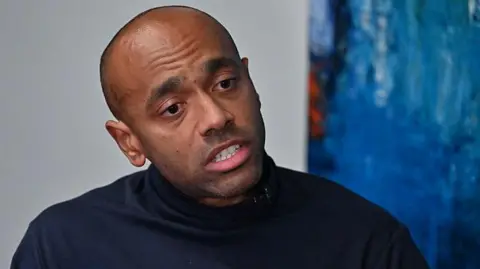 AFP via Getty Images
AFP via Getty ImagesSylvia Bongo was born in France and holds French nationality as does her son.
They have claimed they were tortured by the military during their detention in Gabon and filed a case in France last year. Gabonese authorities have denied the allegations.
Noureddin was ordered to pay the extra $2.1bn fine due to his role as the General Coordinator of Presidential Affairs, a position that allegedly made him the main architect of a corruption syndicate.
The fine is the Gabonese authorities’ estimate of the monies he had allegedly embezzled.
He was also accused of forgery as he reportedly had the president’s signature and seal, which were allegedly used to siphon funds from the state. He denies all the charges.
The Bongo family ruled Gabon for more than five decades. Ali Bongo was in power for 14 years before he was ousted. He had succeeded his father, Omar Bongo, who had ruled for 42 years.
Over the years, the family has been accused of amassing wealth for themselves at the expense of the country – allegations they deny.
Despite being an oil-rich nation, about a third of Gabon’s population lives below the poverty line, according to the UN.
More about Gabon from the BBC:
 Getty Images/BBC
Getty Images/BBCCoinbase and BVNK, a stablecoin startup, cancel $2 billion acquisition deal
One of the largest deals ever for a stablecoin startup has fallen through. Coinbase and the U.K.-based BVNK have called off acquisition talks, a spokesperson for the crypto exchange confirmed to Fortune. It wasn’t immediately clear why the two companies iced the deal, which had gotten as far as the due diligence process and seen the crypto giant and BVNK enter into exclusivity in October, meaning the startup couldn’t entertain offers from other bidders.
The acquisition price for BVNK—which helps customers use stablecoins for payments, cross-border transactions, and other use cases—was around $2 billion. If the deal had gone through, it would have been nearly double the $1.1 billion the fintech giant Stripe paid to acquire the stablecoin startup Bridge in an acquisition that closed in February.
“We’re continuously seeking opportunities to expand on our mission and product offerings,” said the Coinbase spokesperson in a statement. “After discussing a potential acquisition of BVNK, both parties mutually agreed to not move forward.”
A spokesperson for BVNK declined to comment.
Stablecoin selloff
Despite Coinbase scuttling its plans to acquire BVNK, stablecoin M&A has been a hot trend in crypto and fintech over the past year.
Stablecoins are cryptocurrencies pegged to underlying assets like the U.S. dollar. They are designed to stay stable, as opposed to more volatile tokens like Bitcoin and Ethereum. Proponents say stablecoins can upgrade legacy financial infrastructure, speed up cross-border payments, and reduce transaction fees.
Their rise has caught the attention of big banks and the largest payments networks—so much so that Mastercard has explored stablecoin acquisitions of its own. The payments giant was previously in the running to acquire BVNK and now is in discussions to acquire the crypto and stablecoin infrastructure company Zerohash for between $1.5 and $2 billion, Fortune previously reported.
Smaller fintechs have also bet on stablecoins. In October, the late-stage payments company Modern Treasury acquired the stablecoin startup Beam for around $40 million. Crypto companies are also exploring their own stablecoin plays, including the decentralized finance heavyweight Aave Labs and the Monad Foundation, which is behind a forthcoming blockchain.
Coinbase would have been the largest crypto-native company to invest heavily into stablecoin infrastructure. The crypto exchange has made a series of high-profile acquisitions since January, including its $2.9 billion purchase of the crypto derivatives exchange Deribit.
“All of this M&A is really in service of our core focus around trading and payments,” said Brian Armstrong, CEO of Coinbase, during the exchange’s third-quarter earnings call.
Update, Nov. 11: Headline and top of article tweaked to better reflect statement from Coinbase.
Partial Collapse of Chinese Bridge
new video loaded: Bridge in China Partially Collapses
By Hannah Yi
November 11, 2025
Advertisement
Expansion of Milk & Honey in the UK with the addition of Bigfoot Music Management and new clients
UK-based talent management company Bigfoot Music Management is becoming part of Lucas Keller‘s Milk & Honey.
Bigfoot and its clients, including Adam Beyer and Joris Voorn, are joining Milk & Honey, as the latter company reiterates its “deep belief in the future growth of techno and underground electronic music”.
Bigfoot’s roster also includes Juliet Fox, Sarah Story, Sam Wolfe, and Will Atkinson.
As a result of the pact, Jeremy Ford, Adam Beyer’s longtime manager, becomes Senior Vice President of Electronic for Milk & Honey globally.
He will be based in Milk & Honey’s London offices.
Said Lucas Keller: “As diverse as the Milk & Honey brand is in mainstream music genres, we are equally invested in underground music.
“We look after unique talent across all facets of the music business, and this deal with Bigfoot to join Milk & Honey represents a further investment into techno and electronic music which is a top priority for [our] company. We are very excited to have Jeremy and his team in our UK office and joining the global M&H outfit.”
Dave Frank, Head of Artist Management & Sports at Milk & Honey, added: “Over the past three decades, Jeremy Ford and Bigfoot Management have built one of the most respected operations in electronic music. From Adam Beyer and Joris Voorn to the iconic Drumcode brand that encompasses record label, events, fashion and globally syndicated radio, their team has played a big role in shaping modern techno and house.
“We’re thrilled to welcome the Bigfoot team into the Milk & Honey family as we combine our networks, relationships and resources in representing and growing world-class talent who are and will be the global stars that drive our scene into the future.”
Ford and his team have played a pivotal role in establishing dance/electronic platforms, such as Drumcode – Beyer’s own label – and Spectrum.
Jeremy Ford, SVP of Electronic, Milk & Honey: “Since its inception Bigfoot has always championed talented artists who possess authenticity and ambition as well as brands, labels and events that also share a purposeful, global vision.
“We’ve always strived to embrace, nurture and develop visionary leaders within the scene. Joining Milk & Honey represents an incredible opportunity for us to expand our reach and strengthen our ability to serve artists in a wider capacity.
“We share the same values, drive, work ethic and belief in building long-term careers so with this partnership and the fusion of two such talented teams we look forward to an exciting future that will no doubt shine a brighter spotlight on those we represent.”
Ant Hippsley, Head of Milk & Honey Music’s UK office, said: “This move reinforces our ambition to build the premier artist management company in the UK. Jeremy and the Bigfoot team have been a standard of excellence in the electronic scene and we’re proud to welcome them into the Milk & Honey family.
“Their roster and expertise perfectly complement what Dave and the team have built globally as we continue to expand our reach and impact for artists.”
Earlier this year, Milk & Honey appointed East Coast executive Andrew Goldstone as head of Electronic.
Outside of its Los Angeles headquarters, Milk & Honey operates offices in Nashville, New York, Dallas, and London.
With the addition of Jeremy Ford, Milk & Honey’s London office will now house 12 executives across writer, producer, and artist management.
The company’s London HQ is currently moving from Shoreditch back to King’s Cross.
Outside of music talent management, Milk & Honey runs ventures including a sports talent representation business, plus a music catalog acquisition brokerage that has completed over $300 million in M&A deals.Music Business Worldwide
What is the reason behind Trump’s discussion on nuclear testing?
The world banned nuclear testing in 1996. The US says it might be time to start again.
Challenging the Client
A required part of this site couldn’t load. This may be due to a browser
extension, network issues, or browser settings. Please check your
connection, disable any ad blockers, or try using a different browser.
Catherine Connolly elected as the 10th President of Ireland
Gabija GataveckaiteBBC NI News Dublin Correspondent , Dublin Castle
 Reuters
ReutersCatherine Connolly has said she will make sure all voices are nurtured and heard during her presidency.
Speaking at Dublin Castle, where she was inaugurated as the 10th President of the Republic of Ireland, she said the country has been undergoing “seismic changes” since the end of the Cold War.
She said she was looking forward to her first visit to Northern Ireland as president and that she would foster an inclusive dialogue across the island.
Connolly was elected in a landslide vote at the end of October, defeating Fine Gael candidate Heather Humphreys.
In her speech, she said “our actions today will shape the world our grandchildren will inherit”.
She also said: “We can and should take real pride in the success of the Good Friday Agreement model of peaceful resolution of conflict.”
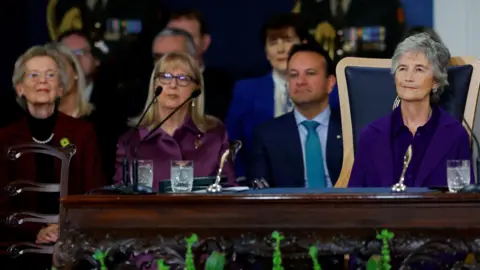 PA Media
PA MediaThe 68 year old has taken over the role from Michael D Higgins, whose 14-year term ended at midnight.
The inauguration ceremony at Dublin Castle on Tuesday was attended by politicians, judges and other invited guests.
As well as Mr Higgins, former Irish presidents, Mary McAleese and Mary Robinson, were in attendance.
Taoiseach (Ireland’s prime minister) Micheál Martin congratulated Connolly on assuming office saying it was a “happy and momentous” day for her and her family.
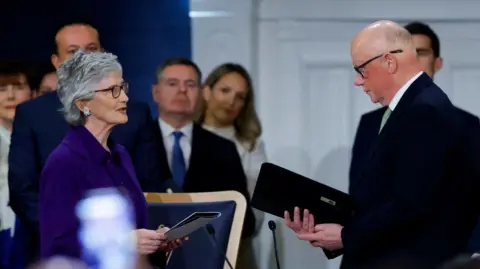 PA
PAThe Republic of Ireland’s president is the country’s head of state, however it is a non-executive role.
On Tuesday morning, she travelled from Farmleigh at Phoenix Park to Dublin Castle with her husband, Brian McEnery, in a ceremonial motorcade.
She was sworn into office in St Patrick’s Hall by the chief justice Donal O’Donnell.
A service of prayer and reflection took place during the ceremony.
Connolly was presented with the Presidential Seal and made a speech.
Who attended the inauguration?
 PACEMAKER
PACEMAKERAs well as the taoiseach, tánaiste (Irish deputy prime minister) Simon Harris, senior Irish government ministers and judges attended the inauguration.
First Minister Michelle O’Neill also attended the ceremony and was accompanied by Sinn Féin president Mary Lou McDonald.
However, in her inauguration speech, Connolly mistakenly called O’Neill “Michelle Smith”.
Deputy First Minister Emma Little-Pengelly did not attended the inauguration.
Little-Pengelly said she has a number of commitments in Belfast and Windsor for Remembrance Day on Tuesday.
She wished the new president well and said she was hoping to have a phone call with her.
 PA Media
PA MediaIn the absence of Little-Pengelly, the Democratic Unionist Party (DUP) did not send a representative to the inauguration, with party leader Gavin Robinson insisting it was not a “snub”.
He said the party would be “pleased” to meet Connolly when she visits Northern Ireland in the future in her formal capacity.
Ulster Unionist Party MLA Steve Aiken was the only unionist politician to attend the inauguration.
He attended in place of party leader Mike Nesbitt who had other commitments.
He said it is not a bad look that he is the only unionist attending the event.
“I actually understand the reasons why some of them weren’t able to make it, because obviously Emma Little-Pengelly would be here in other circumstances, but today is Armistice Day,” he told BBC News NI.
“And it’s very important for her to be in Belfast and also to be with our head of state, the King, in Windsor Castle.
“There’s no snub, or no snub are intended, and that’s why I am here.
“I am here, I am a unionist, and we have a substantial part of the vote. So we are here and we are showing the respect due to the president.”
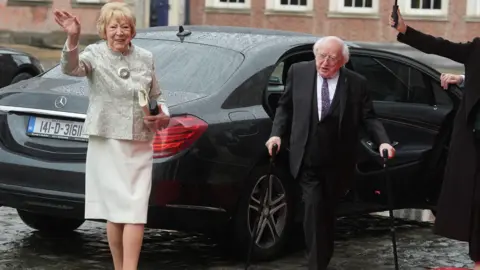 PA Media
PA MediaAfter the ceremony, the newly inaugurated president travelled to Áras an Uachtaráin, the official home of the Irish president, via motorcade.
Connolly was guest of honour at a state reception in Dublin Castle on Tuesday evening.
On Wednesday, she will visit a gaelscoil (Irish language school) in Dublin, a family resource centre in County Meath and a nursing home in County Galway.
Connolly has served as a TD (member of Irish parliament) since 2016 and her election as president will trigger a by-election in Galway West.
She previously worked as a barrister and psychologist.
Deputy PM says Vietnam is poised to sign trade deal with U.S. in the near future
Vietnam expects to sign trade deal with U.S. soon, deputy PM says





